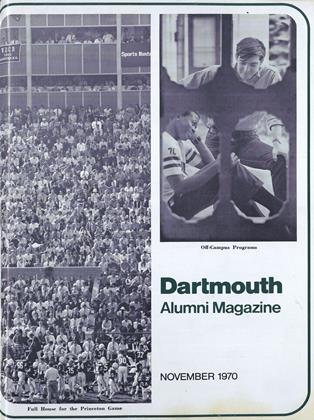One of the knottiest problems facing the State Department today involves the question of dual citizenship, particularly as it applies to American citizens who have joined the Israeli armed forces. The situation is further complicated when one of these persons is taken prisoner. Frederick Smith Jr. '49, deputy administrator of the State Department's Bureau of Security and Consular Affairs, has the job of figuring out what is the United States' obligation to a citizen in this predicament.
The dual citizenship status exists because, under Israels law, all Jews who come to Israel for permanent residence are considered to be Israeli citizens. According to our laws, as interpreted in a recent decision by the Supreme Court, an American cannot lose his citizenship by serving in the armed forces of another country unless it is his intent to relinquish his citizenship. The complicating factor is an Act of Congress which says that joining the armed forces of a foreign state will result in the individual's expatriation, regardless of his intent.
In the first case of this kind considered by Smith and the other legal officers in his department, the determination was that the burden of proof as to whether or not he intended to relinquish his American citizenship lay with the young man. The case involved an American-Israeli pilot, captured by the Egyptians, who turned out to be not interested in having his problem taken up by Smith's agency.
Because of the diplomatic difficulties inherent in trying to help an American in this kind of trouble, the State Department strongly discourages U. S. citizens from joining the armed forces of other nations. However, there are now 20 to 30 thousand Americans in Israel, according to Smith's estimates, and while the number of those in the dual citizenship status now fighting for Israel is unverified, it may be several hundred.
Fred Smith has been with the State Department since 1957 and was appointed to head the Bureau of Security and Consular Affairs in April 1968. The case involving the prisoner of war is just one of the concerns of the Office of Special Consular Services, that part of the bureau which handles the problems of U. S. citizens abroad. They assist a traveler who becomes ill, is arrested, or unexpectedly runs out of money while abroad. They also see that the bodies of persons who die while overseas are returned and that social security and other benefits reach Americans and aliens living abroad. They also get asked to help bring back runaway children, errant husbands, and most recently had to arrange the return of students touring Europe under the auspices of an agency which suddenly went bankrupt.
That Fred Smith became a high-ranking State Department official before he was 40 is typical of the precocity which has characterized most of his achievements. He was the youngest man in the class of '49 and the youngest member of his 1952 class at Cornell Law School, where he specialized in international affairs. He passed the New Hampshire bar examinations at the age of 22.
After law school, he practiced law in Concord, N. H., for a year and then entered the Navy. During his four years of active duty, he served as Gunnery Officer and later Lieutenant aboard the USS Platte in the Pacific.
In 1958 he joined the State Department as an Assistant Legal Adviser for Inter-American Affairs, and moved to Security and Consular Affairs in 1964. Author of the chapter on Extradition which covers some 400 pages in Volume 6 of Whiteman's Digest of International Law, he is recognized as one of the leading authorities on extradition in Washington today.
Fred prepared for Dartmouth at New Hampton School where his father is Headmaster Emeritus and his brother-in-law, T. Holmes Moore, is the present headmaster. He is married to the former Sharon Higbie of Kalamazoo, Mich., and they and their four children, Allison, 9, Meredith, 8, Tory, 7, and Adam, 5, live in Falls Church, Va. They return to New Hampshire every summer for vacation.
Frederick Smith Jr. '49
 View Full Issue
View Full Issue
More From This Issue
-
 Feature
FeatureWhat Is a Conservative?
November 1970 By NORMAN LAZARE '40 -
 Feature
FeatureOpportunities for the Coming Year
November 1970 -
 Feature
FeatureThe Boom in Off-Campus Study
November 1970 By JAMES L. FARLEY '42 -
 Feature
FeatureALUMNI ALBUM-30
November 1970 By —BARBARA BLOUGH -
 Article
ArticleBig Green Teams
November 1970 -
 Article
ArticleThe ROTC Decision: An Explanation
November 1970 By ARTHUR LUEHRMANN
Article
-
 Article
ArticleSCHOLARSHIP PLAQUE GOES TO SOMERVILLE
April, 1922 -
 Article
ArticlePHI SIGMA KAPPA LEADS FOR 1924-25 SCHOLARSHIP TROPHY
August, 1925 -
 Article
ArticleVALUABLE BOOKPLATES GIVEN TO COLLEGE
AUGUST, 1928 -
 Article
ArticleTHE COLLEGE
OCTOBER 1958 -
 Article
ArticleUnconventional Wisdom For New Grads
July/August 2012 -
 Article
ArticleCider and Doughnuts
October 1976 By PIERRE KIRCH '78

